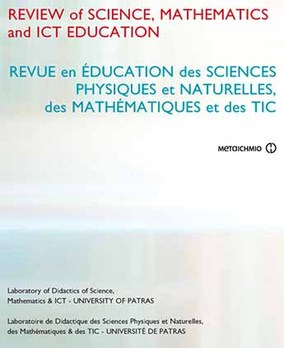Middle school students using energy analysis in diverse phenomena
Part of : Review of science, mathematics and ICT education ; Vol.6, No.1, 2012, pages 73-87
Issue:
Pages:
73-87
Abstract:
Teaching and learning about energy, especially in the elementary and middle schoolgrades, constitutes a challenging topic that has received much attention within thescience education research literature. Despite this, it is important to notice the lackof consensus on a range of relevant issues (e.g., whether - and how - to address thenature of energy as a scientific construct). In this study we briefly discuss thechallenge inherent in introducing and elaborating energy in school science and theinadequacy of conventional teaching approaches in addressing this challengeeffectively. Next, we outline the rationale underlying a novel teaching proposal andthe corresponding curriculum materials. The remaining part of the paper presentsa portion of the results of the analysis of preliminary data that have emerged duringthe implementation of the curriculum materials with a group of 28 students aged12-14. These results demonstrate the potential of the curriculum materials to helpstudents construct understanding about the transphenomenological, unifying natureof energy and also to develop the ability to employ energy for analyzing simple,unknown physical systems so as to derive qualitative accounts for system changes.
Subject:
Subject (LC):
Keywords:
energy, epistemological awareness, scientific constructs, trans-phenomenological aspect, system analysis , Énergie, prise de conscience épistémologique, constructions scientifiques, aspect trans-phénoménologique, analyse systémique
Notes:
Περιέχει σχήματα, πίνακες και βιβλιογραφία, Ειδικό αφιέρωμα: Energy in Education
References (1):
- AAAS (1993). Benchmarks for science literacy (New York: American Association for theAdvancement of Science).Arons, A. B. (1990). A guide to introductory Physics teaching (New York: Wiley).Boohan, R. & Ogborn, J. (1996). Differences, energy and change: a simple approach throughpictures. School Science Review, 78(283), 13-19.Doménech, L. J., Gil-Pérez, G., Gras-Mart_, A., Guisasola, J., Mart›nez-Torregrosa, J., Salinas, J.,Trumper, R. & Valdés, P. (2007). Teaching of energy issues: a debate proposal for a globalreorientation. Science & Education, 16(1), 43-64.Driver, R. & Millar, R. (eds) (1985). Energy matters (Leeds: University of Leeds, Center forStudies in Science and Mathematics Education).Driver, R. & Warrington, L. (1985). Students’ use of the principle of energy conservation inproblem situations. Physics Education, 20, 171-176.Duit, R. (1984). Learning the energy concept in school-empirical results from the Philippines andWest Germany. Physics Education, 19, 59-66.Koliopoulos, D. (1997). Epistemological and didactic dimensions of the curriculum constructionprocesses: The case of the didactic transposition and learning of the energy concept, UnpublishedDoctoral Dissertation in Greek (Patras, Greece: University of Patras).Lawson, R. A. & McDermott, L. C. (1987). Student understanding of the work-energy andimpulse-momentum theorems. American Journal of Physics, 55(9), 811-817.Lederman, N. G. (2007). Nature of science: past, present, and future. In S. K. Abell & N. G.Lederman (eds) Handbook of Research on Science Education (Mahwah, New Jersey: LawrenceErlbaum Associates), 831-879.McDermott and the Physics Education Group at the University of Washington (1996). Physicsby Inquiry, Vol. II (New York: Wiley).Millar, R. (2000). Energy. In D. Sang (ed.) Teaching secondary physics (London: John Murray), 1-43.Nordine, J., Krajcik, J. & Fortus, D. (2011). Transforming energy instruction in middle school tosupport integrated understanding and future learning. Science Education, 95(4), 670-699.Papadouris N., Constantinou, C. P. & Kyratsi, T. (2008). Students’ use of the energy model toaccount for changes in physical systems. Journal of Research in Science Teaching, 45(4), 444-469.Schmid, G. (1982). Energy and its carriers. Physics Education, 17, 212-219.Solomon, J. (1992). Getting to know about Energy - in school and society (London: The FalmerPress).Van Heuvelen, A. & Zou, X. (2001). Multiple representations of work-energy processes.American Journal of Physics, 69(2), 184-194.




